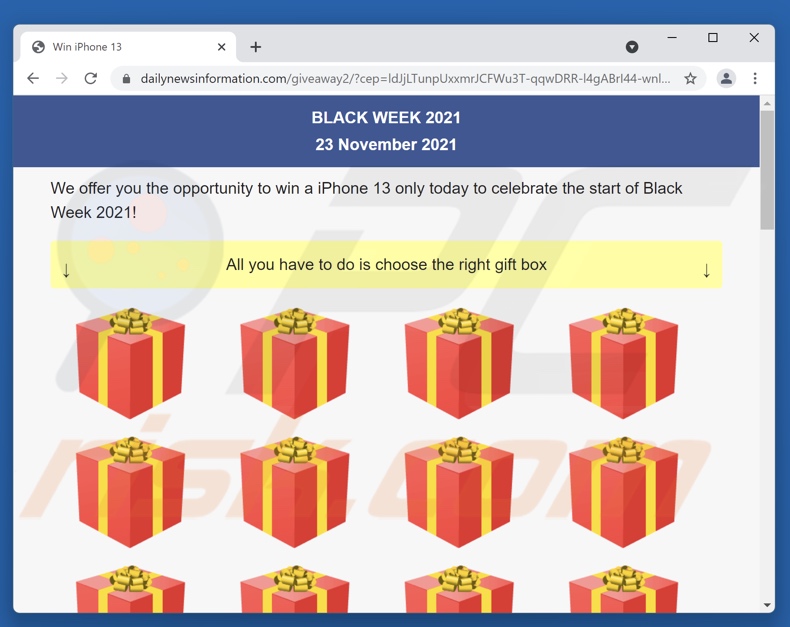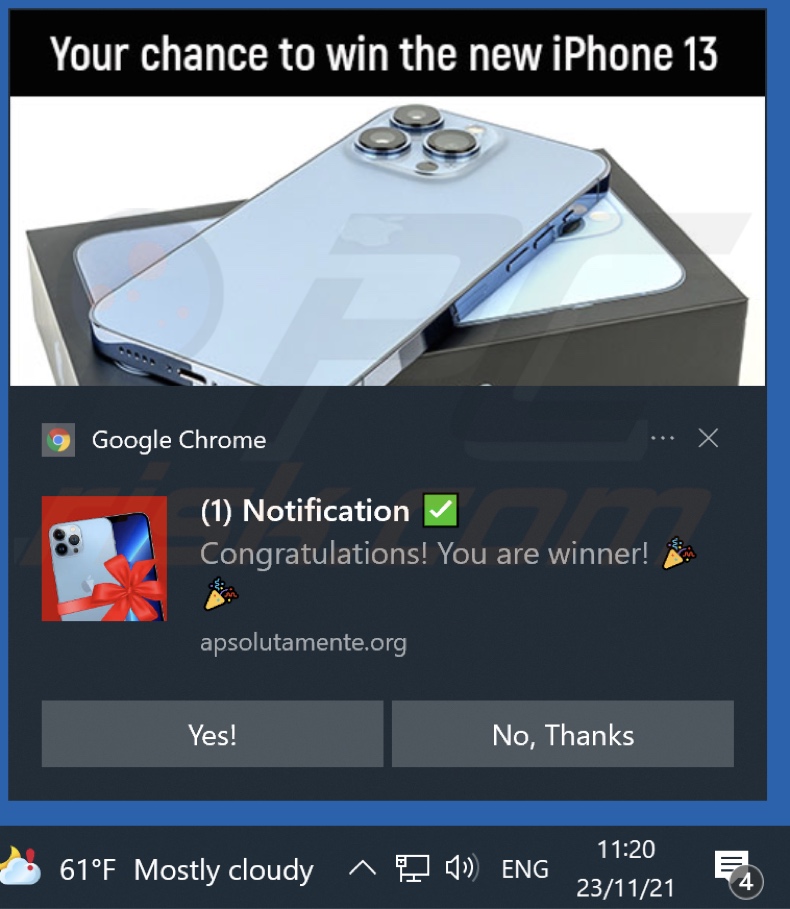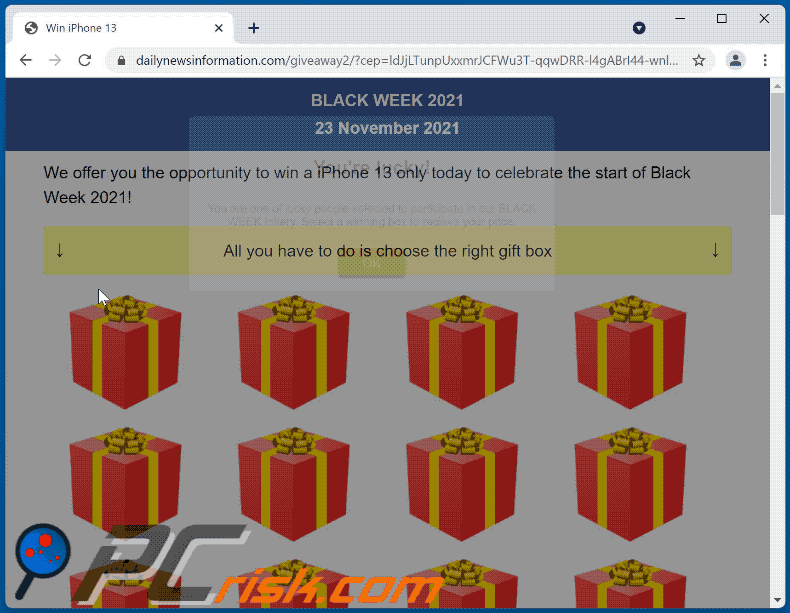Avoid getting scammed by the fake "BLACK WEEK Lottery"
Phishing/ScamAlso Known As: BLACK WEEK Lottery pop-up
Get free scan and check if your device is infected.
Remove it nowTo use full-featured product, you have to purchase a license for Combo Cleaner. Seven days free trial available. Combo Cleaner is owned and operated by RCS LT, the parent company of PCRisk.com.
What is "BLACK WEEK Lottery"?
"BLACK WEEK Lottery" is an online scam. It promises that users can win a prize. However, by trusting it - victims can experience various severe privacy and finance related issues. Scheme-endorsing sites are usually accessed via mistyped URLs or redirects caused by rogue webpages, intrusive advertisements, or installed PUAs (Potentially Unwanted Applications).

"BLACK WEEK Lottery" scam overview
When a website promoting "BLACK WEEK Lottery" is accessed, it displays a pop-up window. It claims that the visitor has been selected to win a prize. The background page states the user can win an iPhone 13 by selecting one of the gift boxes presented below.
Typically, schemes like "BLACK WEEK Lottery" operate as phishing scams. In other words, they target data, e.g., personally identifiable details, finance-related information (banking account and credit card numbers, etc.), account log-in credentials (usernames/passwords), and so on.
How the information is obtained - varies. Users can be asked to disclose it, type it into a website (which is presented as a secure payment gateway, account sign-in page, etc.), or similar.
Victims may also be asked to make relatively small payments (e.g., transaction, shipping, storage, registration, subscription, or other bogus fees). In addition to losing the money they transfer, users can also inadvertently reveal their financial data.
To summarize, "BLACK WEEK Lottery" is fake - and users will not receive any of the promised prizes. Victims of this scam can experience severe privacy issues, financial losses, and even identity theft.
| Name | BLACK WEEK Lottery pop-up |
| Threat Type | Phishing, Scam, Social Engineering, Fraud |
| Fake Claim | Scam claims that visitors have been selected to win a prize. |
| Related Domains | dailynewsinformation[.]com |
| Detection Names (dailynewsinformation[.]com) | CRDF (Malicious), CyRadar (Malicious), Fortinet (Phishing), G-Data (Malware), Kaspersky (Malware), Full List Of Detections (VirusTotal) |
| Distribution methods | Compromised websites, rogue online pop-up ads, potentially unwanted applications. |
| Damage | Loss of sensitive private information, monetary loss, identity theft, possible malware infections. |
| Malware Removal (Windows) |
To eliminate possible malware infections, scan your computer with legitimate antivirus software. Our security researchers recommend using Combo Cleaner. Download Combo CleanerTo use full-featured product, you have to purchase a license for Combo Cleaner. 7 days free trial available. Combo Cleaner is owned and operated by RCS LT, the parent company of PCRisk.com. |
Online scams in general
"SPIN FOR REWARD", "Millionaire (Миллионером)", "Win The New iPhone 12", and "Chance To Win The New iPad Pro" are some examples of scams akin to "BLACK WEEK Lottery". The Internet is full of misleading, deceptive, and malicious content. There are many scam models, e.g., fake lotteries, giveaways, virus warnings, outdated software alerts, etc. Due to how widespread schemes are online, it is recommended to exercise caution when browsing.
How did potentially unwanted applications install on my computer?
Redirects to deceptive websites are commonly caused by PUAs installed onto devices. Additionally, unwanted applications can have other undesirable/dangerous abilities (e.g., adware, browser hijackers, etc.).
This software can infiltrate systems as legitimate content from misleading download pages. PUAs are also spread using the "bundling" method - packing regular programs with unwanted/malicious supplements. Rushed downloads/installations increase the risk of allowing bundled content into the device.
Intrusive advertisements are employed to spread these apps as well. Upon being clicked, the adverts can execute scripts to make stealthy downloads/installations.
How to avoid installation of potentially unwanted applications?
It is advised to research software and download it from official/verified sources. Untrustworthy download channels, e.g., unofficial and freeware sites, Peer-to-Peer sharing networks, etc. - often offer bundled programs/media.
When downloading/installing, it is recommended to read terms, explore possible options, use the "Custom/Advanced" settings, and opt-out from all additions. Intrusive ads appear legitimate; however, they redirect to unreliable/questionable websites (e.g., gambling, adult-dating, pornography, etc.).
In case of encounters with advertisements and/or redirects of this kind, the device must be checked and all suspicious applications and browser extensions/plug-ins detected - immediately removed from it. If your computer is already infected with PUAs, we recommend running a scan with Combo Cleaner Antivirus for Windows to automatically eliminate them.
Text presented in "BLACK WEEK Lottery" scam:
Pop-up:
You are one of lucky people selected to participate in our BLACK WEEK lottery. Select a winning box to recieve your price.
----------------
Background page:
BLACK WEEK 2021
23 November 2021
We offer you the opportunity to win a iPhone 13 only today to celebrate the start of Black Week 2021!
All you have to do is choose the right gift box
Screenshot of a browser notification/ intrusive advertisement promoting the "BLACK WEEK Lottery" scam:

The appearance of "BLACK WEEK Lottery" pop-up scam (GIF):

Instant automatic malware removal:
Manual threat removal might be a lengthy and complicated process that requires advanced IT skills. Combo Cleaner is a professional automatic malware removal tool that is recommended to get rid of malware. Download it by clicking the button below:
DOWNLOAD Combo CleanerBy downloading any software listed on this website you agree to our Privacy Policy and Terms of Use. To use full-featured product, you have to purchase a license for Combo Cleaner. 7 days free trial available. Combo Cleaner is owned and operated by RCS LT, the parent company of PCRisk.com.
Quick menu:
- What is BLACK WEEK Lottery pop-up?
- How to identify a pop-up scam?
- How do pop-up scams work?
- How to remove fake pop-ups?
- How to prevent fake pop-ups?
- What to do if you fell for a pop-up scam?
How to identify a pop-up scam?
Pop-up windows with various fake messages are a common type of lures cybercriminals use. They collect sensitive personal data, trick Internet users into calling fake tech support numbers, subscribe to useless online services, invest in shady cryptocurrency schemes, etc.
While in the majority of cases these pop-ups don't infect users' devices with malware, they can cause direct monetary loss or could result in identity theft.
Cybercriminals strive to create their rogue pop-up windows to look trustworthy, however, scams typically have the following characteristics:
- Spelling mistakes and non-professional images - Closely inspect the information displayed in a pop-up. Spelling mistakes and unprofessional images could be a sign of a scam.
- Sense of urgency - Countdown timer with a couple of minutes on it, asking you to enter your personal information or subscribe to some online service.
- Statements that you won something - If you haven't participated in a lottery, online competition, etc., and you see a pop-up window stating that you won.
- Computer or mobile device scan - A pop-up window that scans your device and informs of detected issues - is undoubtedly a scam; webpages cannot perform such actions.
- Exclusivity - Pop-up windows stating that only you are given secret access to a financial scheme that can quickly make you rich.
Example of a pop-up scam:

How do pop-up scams work?
Cybercriminals and deceptive marketers usually use various advertising networks, search engine poisoning techniques, and shady websites to generate traffic to their pop-ups. Users land on their online lures after clicking on fake download buttons, using a torrent website, or simply clicking on an Internet search engine result.
Based on users' location and device information, they are presented with a scam pop-up. Lures presented in such pop-ups range from get-rich-quick schemes to fake virus scans.
How to remove fake pop-ups?
In most cases, pop-up scams do not infect users' devices with malware. If you encountered a scam pop-up, simply closing it should be enough. In some cases scam, pop-ups may be hard to close; in such cases - close your Internet browser and restart it.
In extremely rare cases, you might need to reset your Internet browser. For this, use our instructions explaining how to reset Internet browser settings.
How to prevent fake pop-ups?
To prevent seeing pop-up scams, you should visit only reputable websites. Torrent, Crack, free online movie streaming, YouTube video download, and other websites of similar reputation commonly redirect Internet users to pop-up scams.
To minimize the risk of encountering pop-up scams, you should keep your Internet browsers up-to-date and use reputable anti-malware application. For this purpose, we recommend Combo Cleaner Antivirus for Windows.
What to do if you fell for a pop-up scam?
This depends on the type of scam that you fell for. Most commonly, pop-up scams try to trick users into sending money, giving away personal information, or giving access to one's device.
- If you sent money to scammers: You should contact your financial institution and explain that you were scammed. If informed promptly, there's a chance to get your money back.
- If you gave away your personal information: You should change your passwords and enable two-factor authentication in all online services that you use. Visit Federal Trade Commission to report identity theft and get personalized recovery steps.
- If you let scammers connect to your device: You should scan your computer with reputable anti-malware (we recommend Combo Cleaner Antivirus for Windows) - cyber criminals could have planted trojans, keyloggers, and other malware, don't use your computer until removing possible threats.
- Help other Internet users: report Internet scams to Federal Trade Commission.
Frequently Asked Questions (FAQ)
What is a pop-up scam?
Pop-up scams are deceptive messages designed to push users into performing specific actions like paying fake fees, downloading/installing content, disclosing private data, and so on.
What is the purpose of a pop-up scam?
Most pop-up scams are intended to generate revenue for their designers. The scammers can profit by selling sensitive information, promoting unwanted/harmful software, proliferating malware, tricking users into making monetary transactions, and so forth.
Why do I encounter fake pop-ups?
Pop-up scams are run on various deceptive sites. These websites are seldom accessed intentionally; most users enter them through mistyped webpage URLs or redirects caused by other rogue sites, browser notifications/ intrusive ads, or installed untrustworthy software.
Will Combo Cleaner protect me from pop-up scams?
Combo Cleaner operates by scanning visited pages and detecting deceptive/malicious websites. Sites designed to promote pop-up scams are also classified as such. Therefore, Combo Cleaner will issue immediate warnings and restrict access to websites of this type.
Share:

Tomas Meskauskas
Expert security researcher, professional malware analyst
I am passionate about computer security and technology. I have an experience of over 10 years working in various companies related to computer technical issue solving and Internet security. I have been working as an author and editor for pcrisk.com since 2010. Follow me on Twitter and LinkedIn to stay informed about the latest online security threats.
PCrisk security portal is brought by a company RCS LT.
Joined forces of security researchers help educate computer users about the latest online security threats. More information about the company RCS LT.
Our malware removal guides are free. However, if you want to support us you can send us a donation.
DonatePCrisk security portal is brought by a company RCS LT.
Joined forces of security researchers help educate computer users about the latest online security threats. More information about the company RCS LT.
Our malware removal guides are free. However, if you want to support us you can send us a donation.
Donate
▼ Show Discussion